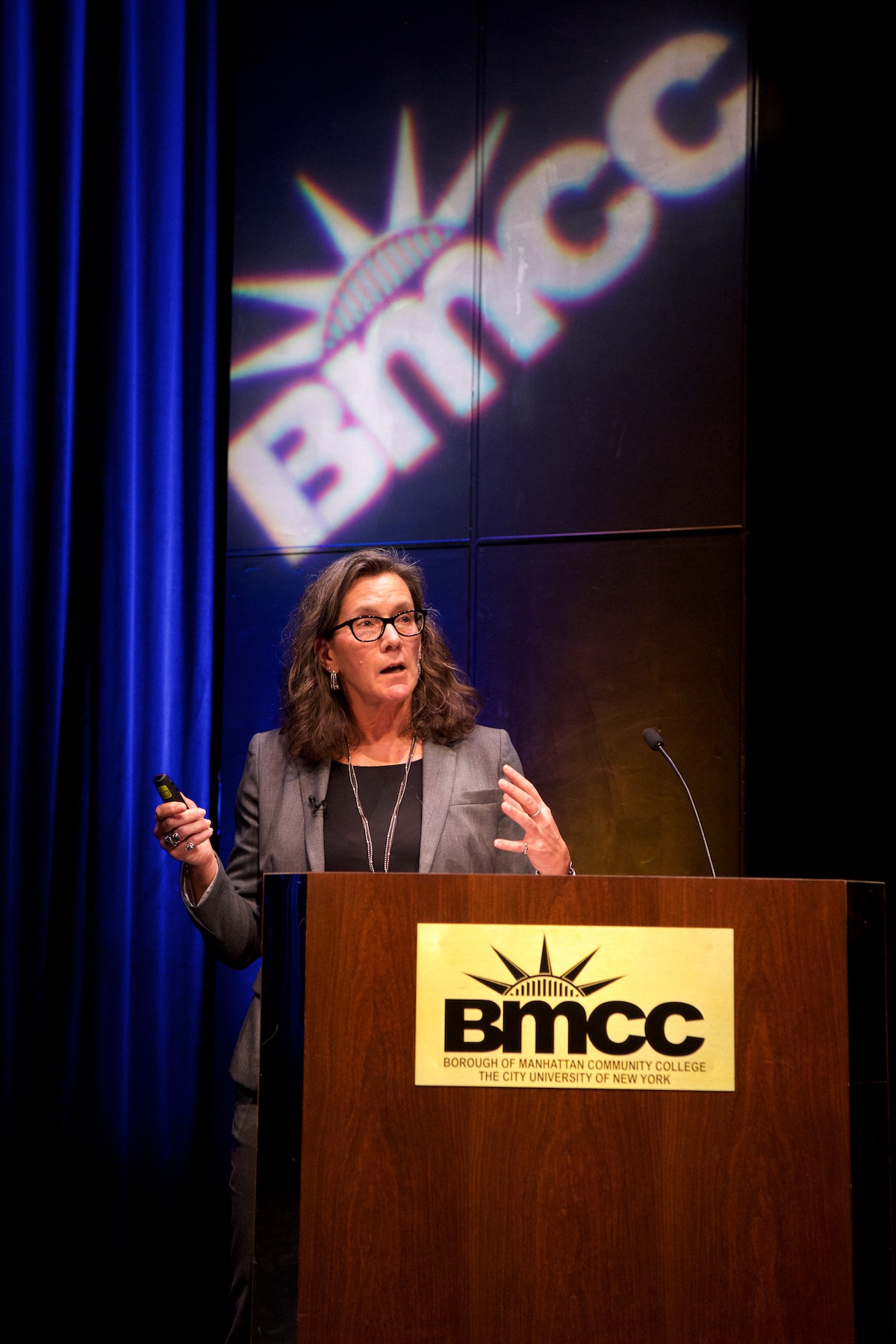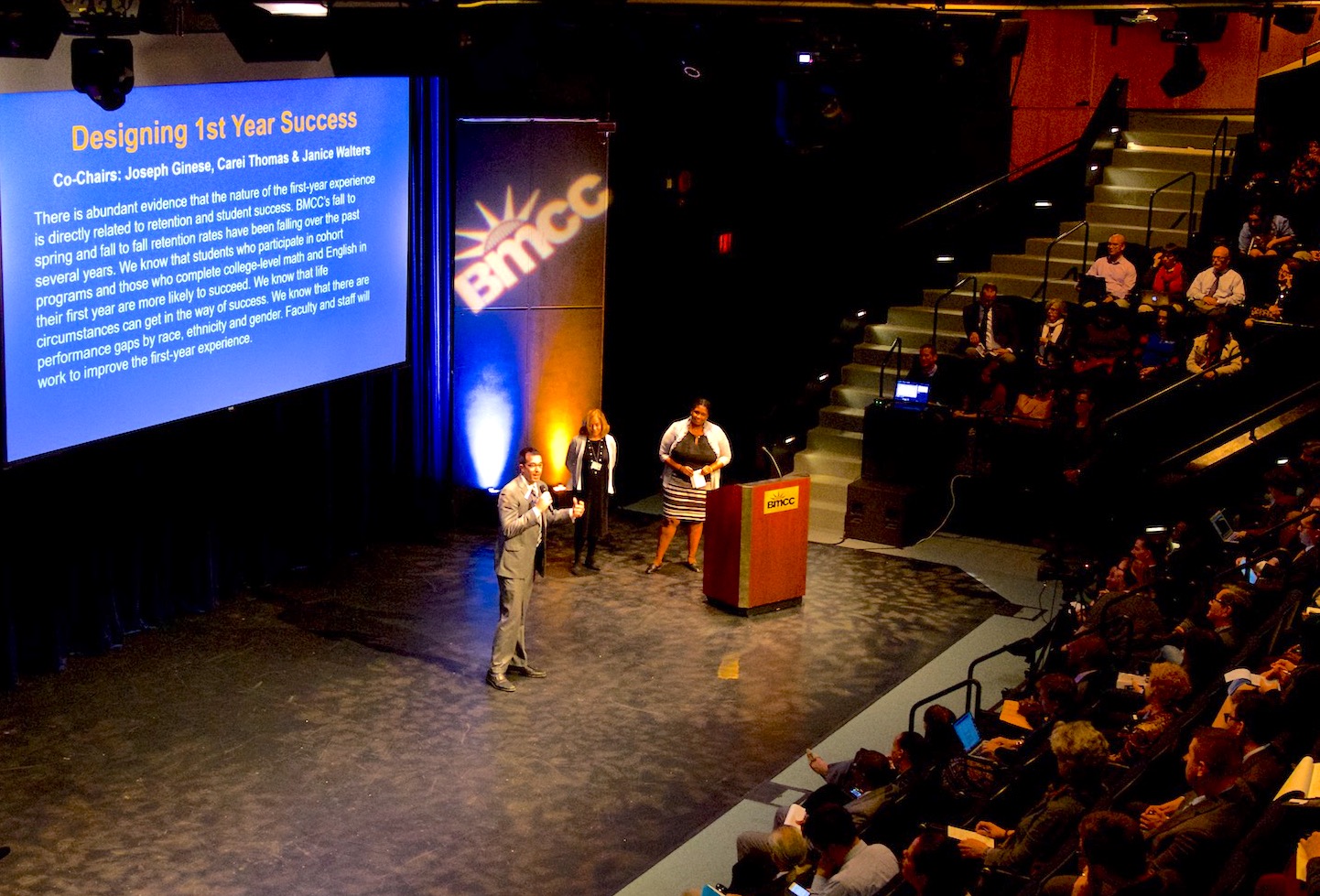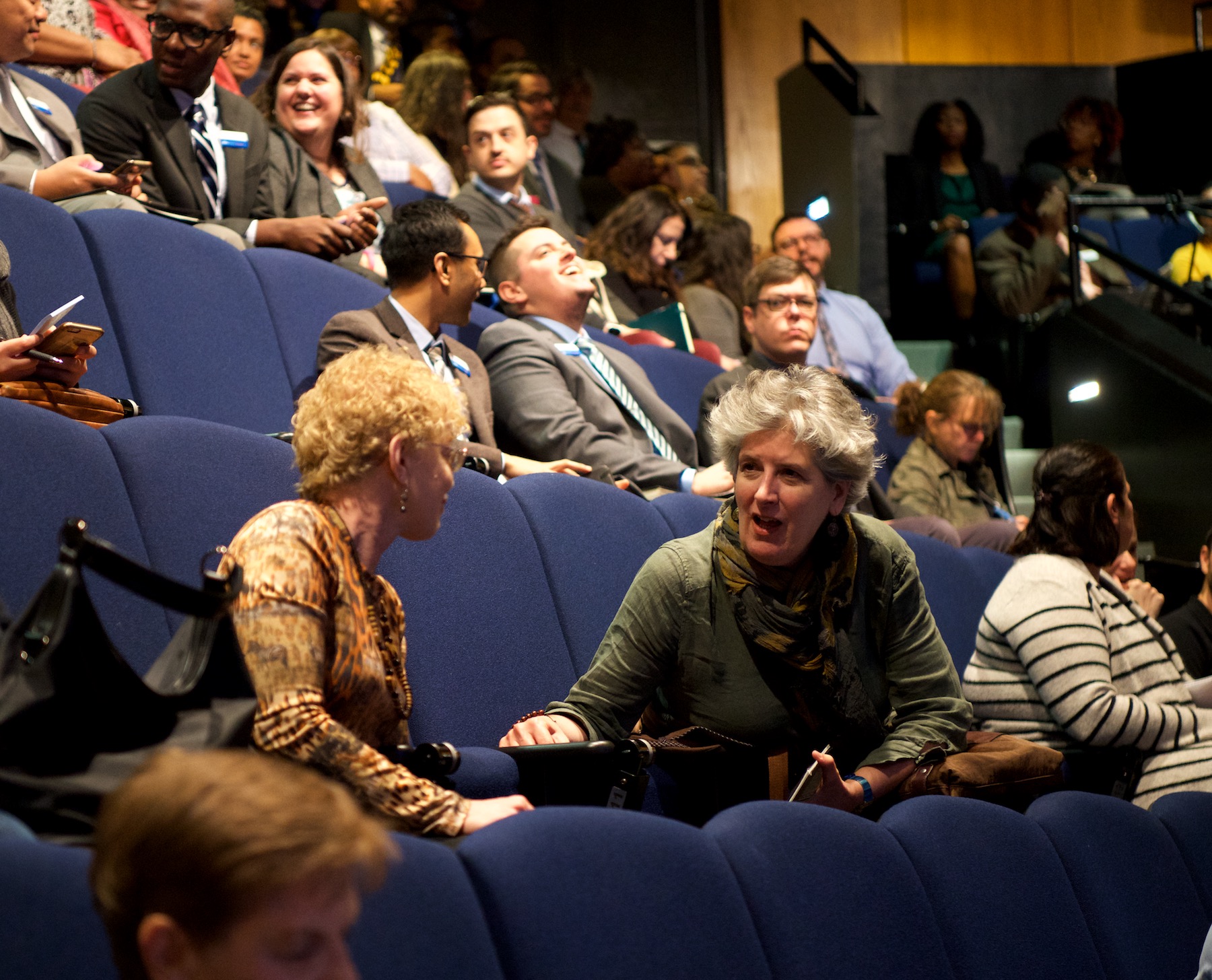Borough of Manhattan Community College (BMCC/CUNY) faculty and staff filled Theatre 2 on October 16 as they gathered for a community forum led by Interim President Karrin E. Wilks.
The purpose of the forum was to provide updates on BMCC’s Designing for Success initiative, collective campus-wide efforts to increase student success “not incrementally, but dramatically,” said Wilks. “We are incrementally improving rates of student retention and graduation but that leaves thousands of students out of the success narrative. We need a sense of urgency and passion in order to improve student success in a more dramatic way.”

President Wilks’ talk was punctuated with two videos telling the stories of recent BMCC graduates, first-generation students who are continuing their higher education at four-year schools. These included business administration alumna Ytzel Flores Cristiansen and video arts and technology alumnus Timothy Rivera.
“These are the kinds of stories we want to increase, and we can’t assume we can do that by doing the same thing that we have always done,” said Wilks. “Our students want degrees. This is what they are telling us. They want upward mobility. We need to redesign what we are doing, in order to create different outcomes.”
Changing strategies, for better outcomes
Retention rates are going down, said President Wilks, and equity gaps are revealed when retention data is disaggregated by race, ethnicity and gender.
“This is the fundamental challenge we need to address, in our planning process,” she said. “We can’t keep doing what we’re doing and achieve a different level of results than this.”
The college’s collective efforts—through five working groups—to buoy student success rates comprise the first phase of BMCC’s Designing for Success initiative, which is part of the BMCC 2015-2020 Strategic Plan: Reaching Greater Levels.
The BMCC Equity and Inclusion initiative is also part of that planning and redesign process.
To put it all in context, President Wilks provided a data-based overview of BMCC student performance in first-year college-level English and math courses and in their three-year graduation rates, disaggregating the data by gender, race and other factors.
The data also reflected students who have reported food and housing insecurity, and the graduation rates of those who have transferred to baccalaureate programs.

Designing for Success is centered on a core belief that students can learn anything under the right conditions, Wilks said, stressing the responsibility of all BMCC employees, “to make students feel welcome, respected and cared for, through every interaction.”
One data-based strategy for student success, she said, has been to create Guided Pathways for students; degree maps and math pathways for all majors. Another strategy is blending developmental and credit-bearing courses so that students move more quickly and efficiently toward graduation. Other efforts include tuition waiver programs and professional development for faculty—especially adjuncts—and staff.
Working groups and a call for charrettes facilitators
Toward the end of President Wilks’ talk, co-chairs of the five Designing for Success working groups presented their groups’ mission and strategies so far.
The Designing Career Maps working group, which focuses on career development activities inside and outside the classroom and by major, is co-chaired by Sunil Gupta, Mahatapa Palit and Lesley Rennis.
The Implementing Career Communities group, which has helped cluster academic majors by labor market field, is co-chaired by Janet Esquirol, Eda Henao and Michael Hutmaker.
The Redesigning Onboarding group, which examines student experience from their earliest interest in BMCC to enrollment and registration, is co-chaired by Joel Barker, Deanne Southwell and Kristin Waters.
The Designing First Year Success group focuses on strengthening student skills as they transition from high school to college and is co-chaired by Joseph Ginese, Carei Thomas and Janice Walters.
The Designing Pedagogy and Research for Student Success group, which strives to help improve teaching and learning, is co-chaired by Jim Berg, Cheryl Comeau-Kirschener and Yevgeniy Milman.
The Equity and Inclusion Initiative, which informs the Design for Success process, is comprised of the Listening Tours subcommittee, chaired by Peter Hoontis; the Professional Development for Faculty and Staff subcommittee, chaired by Kelly Rodgers, and the Formats for Programs to Collaborate Regarding Equity Issues and Advancing Equity, chaired by Ashtian Holmes.
Business Management Professor Peter Hoontis, who chairs the listening tours subcommittee, urged BMCC students, faculty and staff who want to lead, take part in or help coordinate a small focus group, also known as a “charrette”—to contact him at their earliest convenience: phoontis@bmcc.cuny.edu.
Feedback from the BMCC community
Following President Wilks’ presentation, members of the audience took the mic and shared thoughts and questions related to the Designing for Success initiative.
“I’m very excited about the new direction we’re headed,” said Deborah Harte, Student Life Manager in the BMCC Single Stop office who suggested that information about student services be more prominently featured in the student onboarding and intake experience. “It’s important to get a sense early on, of our students’ needs, and connecting them to services earlier in the process,” Harte said.

Professor James Blake congratulated the Designing for Success working teams who presented updates on their work, and shared a concern about BMCC students’ first-year experience and transition from high school to college. “Research shows that a first-year course is an effective way to link students to the services they need,” he said, and proposed that such a course be re-integrated into the first-year curriculum at BMCC.
Eric Glaude, BMCC Coordinator of Student Veterans Services, brought up the importance of counseling as a component in the Redesigning for Success approach.
Another audience member stressed the importance of not referring to developmental education as “support,” when developmental course content is blended with credit-bearing content to move students more efficiently through remediation. “If it’s seen as a support, the value and expertise of those who are teaching developmental education is diminished,” he said. “We have to think of vocabulary—it’s not just support. It’s a lot more than that.”
English Professor Jason Schneiderman commented that it is exciting to see the college “invested in systems and the integration of systems,” and reported that attendance has “crept up,” in his department’s co-requisite course which blends developmental and credit-bearing instruction.
“Lower class size is better,” he said, bringing up the challenge of maintaining the integrity of programs, when they are taken to scale.
Lisa Rose, a professor in the human services department, made the point that “faculty work very hard. They teach lots of courses and do their own research. Staff is stretched, too. While we want to get involved, it would be helpful if the committees would talk about what participation means in terms of commitment, how time is going to be allotted to these efforts.”
Public Affairs Photographer and Digital Marketing Coordinator Louis Chan commented on the importance of staff development for BMCC’s more than 1,500 staff members. “The growth mindset that we maintain in support of students is equally important as we support staff at the college,” he said.
President Wilks provided constructive feedback for each participant’s comments, and encouraged BMCC community members to participate in working groups and charrettes opportunities that are part of the Equity and Inclusion, Listening Tours sub-committee.
STORY HIGHLIGHTS
- Interim President Karrin E. Wilks hosts BMCC community forum on the college-wide initiative, Designing for Success
- Designing for Success is part of the BMCC 2015-2020 Strategic Plan: Reaching Greater Levels
- Faculty, staff and students are encouraged to participate in working groups and charrettes opportunities

